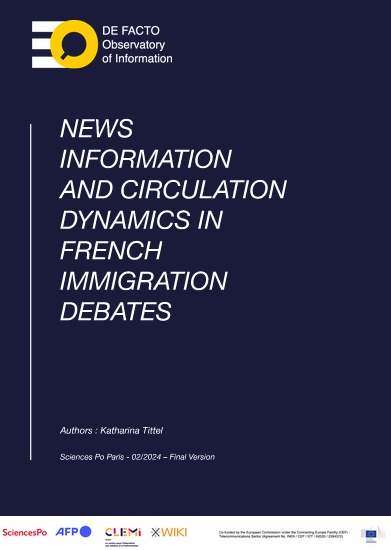Dynamique de l'information et de la circulation des actualités dans les débats sur l'immigration en France

Les « fake news », « infox » ou « intox » autour de l'immigration sont une question controversée en France. Bien que des histoires pas tout à fait vraies aient existé et aient été propagées par les journaux bien avant la préoccupation actuelle concernant les « fake news » (Tucher 2022), la crainte que leur circulation sur les médias sociaux puisse altérer significativement leur impact a propulsé le sujet au sommet des agendas des décideurs politiques. En réponse à la menace posée par la désinformation, plusieurs initiatives ont été développées, notamment des efforts de fact-checking concentrés sur l'immigration. Cependant, de plus en plus, l'efficacité de la vérification des faits ainsi que la prévalence et l'impact de la désinformation en ligne ont été remises en question (par exemple, Altay, Berriche et Acerbi 2023), renouvelant l'importance d'explorer le lien entre la (dés)information et l'écosystème médiatique et politique plus large. Cet article vise à contribuer à cette discussion en réalisant une analyse des dynamiques d'information et de circulation des nouvelles liées à l'immigration. Il cherche à fournir un aperçu des schémas de désinformation liée à l'immigration dans le contexte médiatique (social) français, et à examiner les dynamiques de l'écosystème médiatique et leur relation avec des problématiques sociétales plus profondes et le contexte socio-politique. En examinant la relation entre les sources médiatiques mainstream et de niche sur X (anciennement Twitter), il cherche à comprendre comment différents acteurs contribuent à la diffusion d'informations liées à l'immigration sur la plateforme.
Auteurs
Katharina Tittel
Référence
Abascal, Maria, Tiffany J. Huang, and Van C. Tran. 2021. “Intervening in Anti-Immigrant Sentiments: The Causal Effects of Factual Information on Attitudes toward Immigration.” The ANNALS of the American Academy of Political and Social Science 697(1): 174–91. doi:10.1177/00027162211053987.
Alesina, Alberto, Armando Miano, and Stefanie Stantcheva. 2018. “Immigration and Redistribution.” doi:10.3386/w24733.
Altay, Sacha, Manon Berriche, and Alberto Acerbi. 2023. “Misinformation on Misinformation: Conceptual and Methodological Challenges.” Social Media + Society 9(1): 20563051221150412. doi:10.1177/20563051221150412.
Antheaume, Alice. 2022. “France | Reuters Institute for the Study of Journalism.” https://reutersinstitute.politics.ox.ac.uk/digital-news-report/2022/france (March 8, 2024).
Barberá, Pablo. 2015. “Birds of the Same Feather Tweet Together: Bayesian Ideal Point Estimation Using Twitter Data.” Political Analysis 23(1): 76–91. doi:10.1093/pan/mpu011.
———. 2015. “Tweeting From Left to Right: Is Online Political Communication More Than an Echo Chamber?” Psychological Science 26(10): 1531–42. doi:10.1177/0956797615594620.
Barrera, Oscar, Sergei Guriev, Emeric Henry, and Ekaterina Zhuravskaya. 2020. “Facts, Alternative Facts, and Fact Checking in Times of Post-Truth Politics.” Journal of Public Economics 182: 104123. doi:10.1016/j.jpubeco.2019.104123.
Bisgaard, Martin. 2019. “How Getting the Facts Right Can Fuel Partisan-Motivated Reasoning.” American Journal of Political Science 63(4): 824–39. doi:10.1111/ajps.12432.
Desrosières, Alain. 1998. The Politics of Large Numbers: A History of Statistical Reasoning. Harvard University Press.
Espeland, Wendy Nelson, and Mitchell L. Stevens. 1998. “Commensuration as a Social Process.” Annual Review of Sociology 24: 313–43.
———. 2008. “A Sociology of Quantification.” European Journal of Sociology / Archives Européennes de Sociologie 49(3): 401–36. doi:10.1017/S0003975609000150.
Grigorieff, Alexis, Christopher Roth, and Diego Ubfal. 2020. “Does Information Change Attitudes Toward Immigrants?” Demography 57(3): 1117–43.
Hall, Stuart. 1973. “Encoding and Decoding in the Television Discourse.” In Centre for Contemporary Cultural Studies, University of Birmingham, https://www.birmingham.ac.uk/Documents/college-artslaw/history/cccs/stencilled-occasional-papers/1to8and11to24and38to48/SOP07.pdf (March 8, 2024).
Hopkins, Daniel J., John Sides, and Jack Citrin. 2019. “The Muted Consequences of Correct Information about Immigration.” The Journal of Politics 81(1): 315–20. doi:10.1086/699914.
Kuklinski, James H. et al. 2000. “Misinformation and the Currency of Democratic Citizenship.” The Journal of Politics 62(3): 790–816.
Lawrence, Eric D, and John Sides. 2014. “The Consequences of Political Innumeracy.” Research & Politics 1(2): 2053168014545414. doi:10.1177/2053168014545414.
Newman, Nic et al. 2022. Reuters Institute Digital News Report 2022. [object Object]. doi:10.60625/RISJ-X1GN-M549.
Nyhan, Brendan, and Jason Reifler. 2010. “When Corrections Fail: The Persistence of Political Misperceptions.” Political Behavior 32(2): 303–30. doi:10.1007/s11109-010-9112-2.
Okely, Judith. 2014. “Recycled (Mis)Representations: Gypsies, Travellers or Roma Treated as Objects, Rarely Subjects.” People, Place and Policy Online: 65–85. doi:10.3351/ppp.0008.0001.0006.
Plique, Guillaume et al. 2021. “Minet, a Webmining CLI Tool & Library for Python.” doi:10.5281/ZENODO.4564399.
Ramaciotti Morales, Pedro et al. 2023. “Inferring Attitudinal Spaces in Social Networks.” Social Network Analysis and Mining 13(1): 1–18. doi:10.1007/s13278-022-01013-4.
Stier, Sebastian, Nora Kirkizh, Caterina Froio, and Ralph Schroeder. 2020. “Populist Attitudes and Selective Exposure to Online News: A Cross-Country Analysis Combining Web Tracking and Surveys.” The International Journal of Press/Politics 25(3): 426–46. doi:10.1177/1940161220907018.
Stocking, Galen, Michael Barthel, and Elizabeth M. Grieco. 2018. Sources Shared on Twitter: A Case Study on Immigration. Pew Research Center. Report. https://apo.org.au/node/131446 (March 15, 2023).
Stojanoski, Mihail. 2020. “Fake News, Child-Kidnapping Gangs and Violence against the Roma Community in France: Making Social Media Accountable.” International Journal on Rule of Law, Transitional Justice and Human Rights 11(11): 53–65.
Sumida, Nami, Mason Walker, and Amy Mitchell. 2019. “Views of the News Media in France.” Pew Research Center’s Journalism Project. https://www.pewresearch.org/journalism/2019/04/23/views-of-the-news-media-in-france/ (April 26, 2023).
Tucher, Andie. 2022. Not Exactly Lying: Fake News and Fake Journalism in American History. Columbia University Press.
Wardle, Claire. 2020. “Understanding Information Disorder.” First Draft. https://firstdraftnews.org/long-form-article/understanding-information-disorder/ (March 8, 2024).
Wood, Thomas, and Ethan Porter. 2019. “The Elusive Backfire Effect: Mass Attitudes’ Steadfast Factual Adherence.” Political Behavior 41(1): 135–63. doi:10.1007/s11109-018-9443-y.
